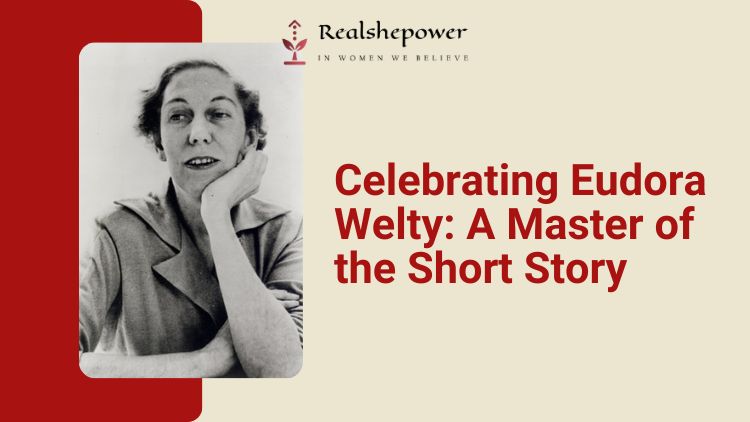Life and Legacy of Eudora Welty: Exploring the Works of the Pulitzer Prize Winner


Welcome, dear readers, to the world of Eudora Welty – a world of vivid characters, evocative landscapes, and heart-warming stories that have captured the hearts of readers for generations. If you’re a fan of Southern literature, or if you’re simply looking for some inspiration from a great writer, you’re in for a treat.
In this article, we’ll explore the fascinating life and work of Eudora Welty, one of the most beloved and influential writers of the 20th century. From her childhood in Jackson, Mississippi to her travels around the world, we’ll take you on a journey through Welty’s life and legacy.
Along the way, we’ll delve into her Pulitzer Prize-winning novels, her collection of poignant short stories, and her captivating photography. We’ll also discover the people and places that shaped her writing, including her friendship with fellow Southern writer William Faulkner.
So sit back, relax, and prepare to be transported to a world of storytelling magic. Whether you’re a longtime fan of Eudora Welty or just discovering her work for the first time, we promise you won’t be disappointed. Let’s dive in!
Table of Contents
Early Life and Career
Eudora Welty was born to Christian Webb Welty, a successful insurance executive, and Mary Chestina Andrews Welty, a schoolteacher. As a child, Welty was an avid reader, devouring books by classic authors such as Jane Austen, Charles Dickens, and Henry James. She went on to attend the Mississippi State College for Women, where she studied English and journalism.
After graduating from college, Welty worked briefly as a teacher and then as a photographer for the Works Progress Administration during the Great Depression. It was during this time that she began to hone her craft as a writer, publishing her first short story, “Death of a Traveling Salesman,” in 1936.
Literary Works
Over the course of her career, Eudora Welty produced an impressive body of work, including novels, short stories, and essays. Some of her most notable works include:
- The Optimist’s Daughter (1972): This novel, which won the Pulitzer Prize, tells the story of Laurel McKelva Hand, a middle-aged woman who returns to her hometown of Mount Salus, Mississippi, to care for her father, Judge McKelva, after his eye surgery. The novel explores themes of loss, grief, and the complexities of family relationships.
- A Curtain of Green (1941): This collection of short stories marked Welty’s debut as a published author. The stories, set in small-town Mississippi, explore the lives of ordinary people and showcase Welty’s gift for capturing the nuances of human behavior.
- Delta Wedding (1946): This novel, set in rural Mississippi in the 1920s, centers around the wedding of a young girl named Dabney Fairchild. The novel offers a rich portrayal of Southern life and culture, and features a large cast of vividly drawn characters.
- The Wide Net and Other Stories (1943): This collection of short stories explores the theme of isolation and features characters who are struggling to connect with others. The stories are set in a variety of locations, from the Mississippi Delta to the Gulf Coast.
- The Golden Apples (1949): This collection of interconnected short stories is set in the fictional town of Morgana, Mississippi. The stories offer a unique portrait of Southern life and showcase Welty’s mastery of the Southern Gothic genre.
Literary Legacy
Eudora Welty’s impact on American literature cannot be overstated. Her works are celebrated for their vivid descriptions of Southern life, their complex characters, and their profound insights into the human condition. Welty’s writing has been compared to that of William Faulkner and Flannery O’Connor, two other Southern writers whose works are considered some of the greatest in American literature.
Welty’s literary legacy extends far beyond her own writings, however. She was also an advocate for the arts and a champion of emerging writers. In the 1960s, she served as a judge for the National Book Awards and was instrumental in promoting the work of writers such as James Baldwin and Mary McCarthy.
Welty’s impact on Southern literature, in particular, has been profound. Her works capture the essence of the South, with its rich cultural heritage, its complex history, and its deep-seated traditions. Her portrayal of Southern life is both affectionate and critical, capturing the region’s beauty as well as its flaws.
Frequently Asked Questions About Eudora Welty
What inspired Eudora Welty’s writing?
Welty’s writing was often inspired by her experiences growing up in Mississippi, as well as her observations of the world around her. She was also influenced by other writers, such as William Faulkner and Katherine Anne Porter.
What is Southern Gothic literature, and how does Welty’s writing fit into this genre?
Southern Gothic literature is a subgenre of American literature that is characterized by its use of dark humor, grotesque characters, and elements of the supernatural. Welty’s writing is often associated with this genre, as she frequently explored themes of death, decay, and decayed Southern culture.
What is the significance of Welty’s Pulitzer Prize-winning novel, “The Optimist’s Daughter”?
“The Optimist’s Daughter” is considered by many to be Welty’s masterpiece. The novel explores themes of loss, grief, and family relationships, and is notable for its nuanced portrayal of the human experience.
How did Welty’s writing influence other writers?
Welty’s writing has been cited as an influence by numerous writers, including Alice Munro, Toni Morrison, and Anne Tyler. Many writers have praised Welty’s ability to capture the complexities of human behavior and the richness of Southern culture.
Conclusion
Eudora Welty was a literary genius, a master of the short story and a powerful novelist whose works continue to resonate with readers today. Her writing offers a unique perspective on Southern life and culture, capturing the complexities and contradictions of the region with remarkable insight and sensitivity. Welty’s legacy extends far beyond her own writings, as she inspired generations of writers and helped to shape the course of American literature in the 20th century. As we celebrate her remarkable achievements on what would have been her 114th birthday, we can only marvel at the depth of her talent and the lasting impact of her legacy.
Resources
- Eudora Welty Foundation: https://eudorawelty.org/
- The Eudora Welty Collection at the Mississippi Department of Archives and History: https://www.mdah.ms.gov/welty/
- Eudora Welty House and Garden: https://www.mdah.ms.gov/welty/house-and-garden/
- The Eudora Welty Review: https://muse.jhu.edu/journal/499
- The Eudora Welty Society: https://eudoraweltysociety.org/


